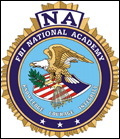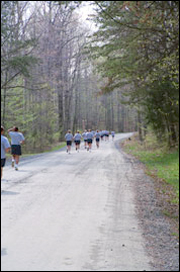National Academy
National Academy
 |
The FBI National Academy is a professional development course for U.S. and international law enforcement leaders. It serves to improve the administration of justice in police departments and agencies at home and abroad and to raise law enforcement standards, knowledge, and cooperation worldwide.
Its mission is “to support, promote, and enhance the personal and professional development of law enforcement leaders by preparing them for complex, dynamic, and contemporary challenges through innovative techniques, facilitating excellence in education and research, and forging partnerships throughout the world.”
National Academy candidates
Leaders and managers of state, local, county, tribal, military, federal, and international law enforcement agencies attend the FBI National Academy. Participation is by invitation only, through a nomination process. Participants are drawn from every U.S. state and territory and from international partner nations.
The course of study
Sessions of approximately 220 officers take undergraduate and/or graduate courses at the FBI campus in Quantico, Virginia. Classes are offered in the following areas: law, behavioral science, forensic science, understanding terrorism/terrorist mindsets, leadership, communication, and health/fitness. Officers participate in a wide range of leadership and specialized training, where they share ideas, techniques, and experiences with each other, creating lifelong partnerships that transcend state and national borders.
 |
The “Yellow Brick Road”
National Academy graduates fondly recall their experience on the “Yellow Brick Road.” The final test of the fitness challenge, the Yellow Brick Road is a grueling 6.1-mile run through a hilly, wooded trail built by the Marines. Along the way, the participants must climb over walls, run through creeks, jump through simulated windows, scale rock faces with ropes, crawl under barbed wire in muddy water, maneuver across a cargo net, and more. When (and if) the students complete this difficult test, they receive an actual yellow brick to memorialize their achievement. The course came to be known as the “Yellow Brick Road” years ago, after the Marines placed yellow bricks at various spots to show runners the way through the wooded trail. The overall fitness challenge began at the National Academy in 1981 and has evolved over the years; we started awarding yellow bricks in 1988.
Brief History of the National Academy
The Academy began July 29, 1935. It was created in response to a 1930 study by the Wickersham Commission that recommended the standardization and professionalization of law enforcement departments across the U.S. through centralized training. With strong support from the International Association of Chiefs of Police and with the authority of Congress and the Department of Justice, the “FBI Police Training School” was born. Courses at that time included scientific aids in crime detection, preparation of reports, criminal investigation techniques, and administration and organization. With the advent of World War II, courses were added in espionage and sabotage.
 |
|
|---|---|
| Students on the range during a 1936 session of the FBI’s National Academy. |
Life after the National Academy
Following graduation, each officer has the opportunity to join the FBI National Academy Associates, Inc., a dynamic organization of more than 16,000 law enforcement professionals who actively work to continue developing higher levels of competency, cooperation, and integrity across the law enforcement community.
NA graduates reflect on value of experience
Interstate cooperation solves case of runaways
Canton (Massachusetts) Police Chief Ken Berkowitz recounted receiving a report in 2006 of two young women who had run away from a secure facility in Canton. Knowing they were vulnerable and after receiving information that they were heading to New York City, Berkowitz contacted a New York Police Department’s (NYPD) lieutenant detective he had met while attending the NA and asked him if the NYPD would dedicate resources to bringing the women back to Canton. Within eight hours, the two were safely returned to the facility. Berkowitz, convinced that the work and networking done at the NA is what found the women, said “Those girls were not found on the streets of New York City; those girls were found in the hallways of the National Academy.”
International cooperation leads to apprehension of fugitive from the U.S.
Lieutenant Larry Horak, Margate (Florida) Police Department, worked a case that involved a con man named Roger Miller fleeing the country after stealing millions of dollars from investors. “Our investigation established that Miller had fled to Thailand, but we were having trouble trying to locate him there,” Horak said. “I thought I had a member of my NA class from the Royal Thai Police, so I sent him an e-mail with a description of Miller, and within 24 hours, I got a response saying ‘We’ve located him—let us know what you’d like us to do.’ “ Horak was then able to initiate the extradition process to bring Miller back for prosecution. “For me,” said Horak, “the NA was unprecedented in any leadership training I’ve received during my career.”
Information from NA class provides valuable starting point in murder investigation
Police Chief Bill Lane, Horseshoe Bay (Texas) Police Department—a graduate of the 135th session of the NA—recounted how the instruction he received while attending the Academy was invaluable during a murder investigation. At the time Chief Lane attended the NA, he was assistant chief of the Hobbs (New Mexico) Police Department. In November 2005, the Hobbs Police Department was investigating the murder of a multimillionaire who was found dead at his lakefront mansion. During the search of the residence, evidence was discovered that indicated the victim had an internal defibrillator. Lane recalled something from one of his NA classes—how information from these defibrillators can sometimes be downloaded, helping to determine the time of death. The information was downloaded and provided a valuable starting point in the investigation, which was ultimately resolved with the assistance of other law enforcement agencies.
Interstate cooperation leads to apprehension of bank robbery suspect
A graduate of the 234th NA session—Police Chief Gerald R. Simpson, Garden Township Police Department (Chester County, Pennsylvania)—recalled that the opportunity to liaison with his NA classmates proved to be a valuable crime-fighting tool later on. At the time he was at the NA, Simpson was a lieutenant with the Newark (Delaware) Police Department. Six months after graduating from the Academy, a bank robbery occurred in his jurisdiction in which the suspect, during his escape, struck another vehicle which caused his own license plate to fall off the car. Police recovered the plate and discovered that the vehicle was a rental from a company in Newburgh, New York. While still at the crime scene, Simpson contacted a National Academy classmate—Charlie Broe, at the time a lieutenant with the Newburgh Police Department in New York—and requested his assistance. The classmate was able to obtain the rental contact which led to the identification of the suspect. Within seven days, law enforcement authorities in New York had located and arrested him.

For more information:
- The nomination process
- International students at the National Academy
Additional resources:
- FBI National Academy Associates
- Marine Corps Base Quantico Guide
Note: The most current National Academy orientation booklet can be obtained for incoming students by accessing the FBI National Academy Special Interest Group (SIG) on Law Enforcement Online (LEO), which is available through the Law Enforcement Enterprise Portal (LEEP).
| Training Links |
|
About FBI Training Training Programs Resources Who We Train |

